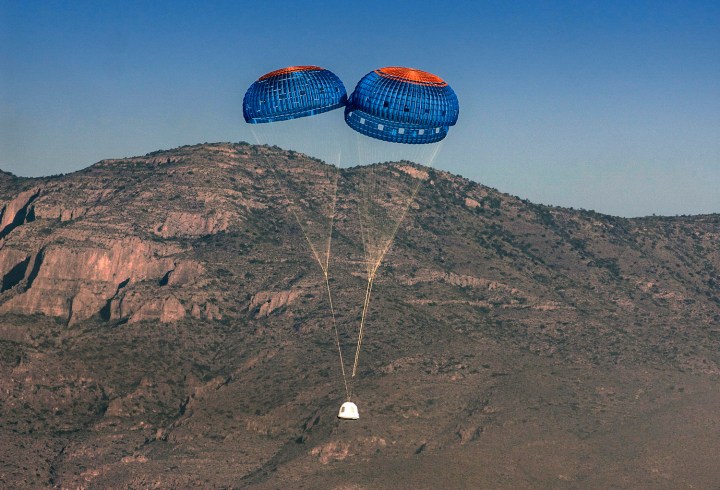
Having so far made three successful launches and landings with New Shepard, the ambitious project is clearly making progress, and while reliability and efficiency are both of vital importance, Bezos knows that when people start climbing aboard, safety will be the top priority.
New Shepard crew and passengers will make the trip inside the capsule attached to the top of the rocket, with up to six people traveling at a time. With most news reports focusing on the more dramatic rocket landings, we rarely hear about the capsule, but on all three missions, this, too, has returned to Earth safely.
However, for the next mission, Bezos plans for the capsule landing to go wrong.
Crash landing
The idea is to demonstrate Blue Origin’s ability to safely handle a failure scenario where one of the capsule’s parachutes fails to properly deploy.
“It promises to be an exciting demonstration,” Bezos said in a message posted online. The team will of course still be hoping for a relatively soft landing, with the capsule using two additional parachutes, as well as a retro-thrust system, to slow its descent.
“One of the fundamental tenets of Blue Origin is that the safest vehicle is one that is robust and well understood,” Bezos wrote. “Each successive mission affords us the opportunity to learn and improve our vehicles and their modeling.”
No date has been set for Blue Origin’s fourth mission, but the Amazon boss promised more information soon.
Related: Blue Origin’s POV video shows its rocket’s rapid return to Earth
Bezos said earlier this year that Blue Origin space tourists are unlikely to need much training for their trip of a lifetime.
“For the suborbital mission, training is going to be relatively simple,” the Blue Origin and Amazon boss said. “One of the things that you have to do is emergency egress, so we’ll train people for that. One of the things you’ll have to be able to do is get out of your seat, and get back into your seat. We want people to be able to get out, float around, do somersaults, enjoy the microgravity, look out of those beautiful windows.”
The cost of a ticket hasn’t yet been revealed, though rival firm Virgin Galactic has been charging around $250,000 for reservations aboard its SpaceShipTwo rocket plane.
Editors' Recommendations
- Blue Origin’s heavy-lift New Glenn rocket raised on launchpad for first time
- See how Blue Origin’s rocket did in first flight since 2022 explosion
- Jeff Bezos’ Blue Origin to make first rocket flight since 2022 explosion
- Watch Blue Origin’s rocket explode mid-flight
- Blue Origin highlights reel celebrates its first space tourism flight of 2022


